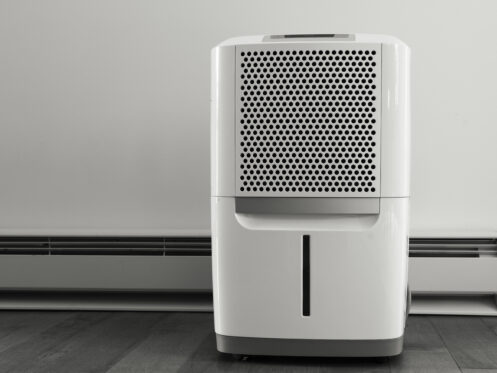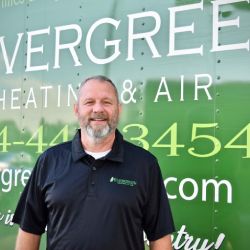Dehumidification is the process of removing water vapor from the air. The higher the moisture content of the air, the higher the humidity. Relative humidity (RH) is the measure of humidity within the context of temperature. A dehumidifier is an appliance that extracts water vapor from air. There are two primary types of dehumidifiers: refrigerant and desiccant dehumidifiers. Refrigerant dehumidifiers pull air across a cooled coil to create condensation. Desiccant dehumidifiers pull air across a desiccant material, such as silica gel, which absorbs the moisture from the air. With this information, let’s consider whether it’s better to run a dehumidifier during winter or summer.
Using a Dehumidifier in Winter
Cool air contracts. As it does, it gets dense and sinks. Due to this contraction, it can’t hold as much water vapor as warmer air. This is why the air is drier in winter and your skin needs more moisturizer. Dry air is particularly notable indoors during winter. Many believe running the furnace causes this. It doesn’t directly, but it does happen as a byproduct. Your furnace or heat pump is constantly drawing in dry air without the replenishment of moisture that would naturally occur outdoors.
Generally, you should not run a dehumidifier in winter. Are there cases where you should run a dehumidifier in winter, though? Yes. One example is a basement. Basements can still be damp in winter, and a dehumidifier can help avoid mildew and mold growth. Above the ground, you should never have an RH high enough in winter to warrant running a dehumidifier. If you do, you likely have a moisture problem.
What Could Be Causing Excess Moisture in Winter?
It doesn’t take much for cold air to become saturated with moisture. There are scenarios where indoor RH can be much higher than you’d expect. A dehumidifier can correct the issue in the short term. That said, you’re better off dealing with the excess moisture directly in the long term. A leak, such as in your roof, is one potential cause. Another is a buildup of moisture in the home materials in late summer and during fall. This likely means that your home isn’t sealed well enough. Other causes can include high occupant count, overwatering plants and frequent operation of water-using appliances.
Using a Dehumidifier in Summer
Warm air rises and expands, which allows it to hold more water vapor. RH is much higher in summer than winter naturally. You likely run your air conditioner in summer. Some dehumidification is a byproduct, but your AC is not a dehumidifier. It’s optimized to transfer heat energy to cool the air. Ideally, it should keep the RH at a reasonable level, but it’s not uncommon for indoor air to feel cool and humid.
The EPA recommends keeping your RH at below 60% at least. It recommends keeping it at between 30% and 50% ideally. If that does not occur through running your AC, then you’ll need a dehumidifier.
The Benefits of Optimal RH in Summer
Even with AC, the EPA recommends a dehumidifier for most climate zones in the U.S. This is certainly true of North Carolina where we deal with high humidity levels in summer. There are four main areas where you benefit from a dehumidifier in summer:
- Health
- Comfort
- Energy efficiency
- Home maintenance
Health Benefits
Warm air not only holds more moisture; it also holds more airborne pollutants and contaminants. This is why humidity is an important point in the discussion about indoor air quality (IAQ). Pollution levels tend to be higher outdoors. Those problems are only exacerbated indoors. High RH can spell trouble for people with asthma and allergies. It will heighten symptoms and trigger them more often. Even in otherwise healthy people, it can lead to more frequent coughing and wheezing.
Comfort Benefits
The RH comfort range for people is between 30% and 50%. Which feels best varies from person to person. When RH is too high, either in general or for you personally, you don’t feel as cool as you otherwise would. You may feel sticky as well. Humid air is also full of additional nitrogen and hydrogen. That’s why it feels more difficult to breathe. Your body is actually working harder to get the oxygen it needs. This is also the reason why people feel lethargic in humid weather and may be more prone to headaches.
Energy Efficiency Benefits
As mentioned earlier, your AC is not a dehumidifier. It’s actually more effective when the humidity is lower. This is why a dehumidifier inline ahead of an AC can have a dramatic effect. It can actually increase the overall energy efficiency of your HVAC system. That translates to a lower carbon footprint and lower month-to-month cooling costs. It also decreases wear and tear on the AC components. That results in longer AC life and a lower total cost of ownership.
Home Maintenance Benefits
A dehumidifier in summer benefits your home as well. Mildew and mold can’t grow in an environment where humidity is low. High humidity is also bad for all the wood that makes up your home’s structure in addition to your hardwood floors. Keeping moisture low extends the life of your insulation. It also helps preserve the paint on your walls, wallpaper, artwork, photographs, books and so forth. Excess moisture is also bad for your electronics, including televisions, audio equipment, computers and so on.
Do You Need a Dehumidifier?
Whether you need a dehumidifier comes down to whether you can maintain a sub-60% RH with AC alone. If you can, you don’t need a dehumidifier. If you can’t, you do. Comfort is a consideration as well. Many people are going to feel remarkably more comfortable at 50% RH or below than 60%.
Portable vs. Whole-Home Dehumidification
Portable systems are the more affordable option in the short term. Whole-home systems are more cost-effective long term and make it much easier to dehumidify air throughout an entire residence. Whole-house solutions will also provide much greater benefits in regard to HVAC and home maintenance. Another consideration is maintenance of the dehumidifier itself. Portable solutions require a lot more. Whole-house solutions drain outside the home and generally only need professional service once a year.
Other Considerations
Crawl spaces are common in North Carolina. A crawl space is a primary source of humidity in a home. In many if not most homes in this area, you can cure humidity problems with a crawl space dehumidifier. This is something you should discuss with your HVAC technician. A crawl space humidifier will typically be more affordable than a whole-house dehumidifier or even a large room dehumidifier.
Your Local IAQ Experts in Mooresville
Evergreen Heating & Air LLC specializes in IAQ for homeowners in Mooresville and throughout the surrounding areas. Our company installs, services and repairs both dehumidifiers and humidifiers in addition to air purifiers. We also have HVAC technicians who install, service and repair ductless mini-splits and all types of ducted systems. Those include furnaces, heat pumps and air conditioners. Contact us today if you have any questions or would like to schedule a consultation or service appointment.



